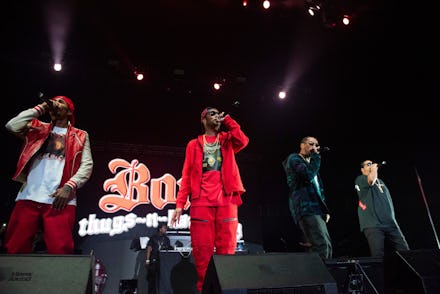Boneless Thugs-N-Harmony and the shameless celebrity brand moment

Few moments are actually without historical precedent, but the Netflix Twitter account sexting with a number of other company accounts last December certainly felt like one. The last two or three years had been leading up to that speed date, as brands have taken on highly personable, meme-literate voices, which all amounts to guerrilla advertising cloaked in relatability. Every brand wants a pull of that virality, and sometimes throwing itself at another company’s social media manager is the easiest way to do so.
It’s only natural that artists would also become entangled in this. Buffalo Wild Wings, certainly not above the horny post, launched one of the more psychedelic viral celebrity campaigns on Wednesday. The rap group formerly known as Bone Thugs-N-Harmony has, at least temporarily, changed its name to Boneless Thugs-N-Harmony as a partnership with the popular wing chain. This was honestly kind of amusing in its own way — they also participated in a Behind the Music style parody video documenting the mock-fractious split about the name change.
Much like when IHOP appeared to change its name to IHOb for one month in 2018, Boneless Thugs are probably not long for this world. All but the most credulous should be skeptical of an announcement that their brand social media handles and Spotify page would be changed to Boneless Thugs-N-Harmony for more than a few weeks. It’s deeply silly to expect authenticity from brands, but that doesn’t make the dizzying recent development of April Fool’s styled campaigns popping up year-round feel any less strange.
While it’s hard to recall a time when an artist committed to a viral campaign to this degree — Maria Sugarpova came close, but couldn’t follow through — brands and artists have been straining for this sort of partnership in recent years. Migos teamed with Popeyes and Uber Eats on the Migos Menu, which featured each member’s signature order and a $46.99 “tour rider” option for any number of people who can eat 20 tenders, five biscuits, one large mashed potatoes, two large fries, and a gallon of lemonade.
These stunts landing are dependent on the entertainer in question, like when Lay’s released three new chip flavors to match three different genre spins on a new Bebe Rexha song called “Right Here, Right Now” with percussive chip crunches. Needless to say, it didn’t. (In the interest of full disclosure, I first searched for “Rita Ora chips” and still found what I was looking for near the bottom of the page.) Migos, Cardi B, and many other rappers also had their own chips, if not through a craven brand partnership, when Rap Snacks custom bags relaunched in 2016.
This all feels singular in a certain way to the social media era, where everyone’s effectively fighting for scraps to be the main character for a day or two, before the next bit of ephemera takes hold. The most recent set of Super Bowl ads kind of distilled this method — a failed viral stunt with the dead peanut man, teasing a huge star’s retirement that just ended up being an ad, and so many celebrity partnerships in the absence of original ideas. Each of those were relatively easy to spot in the lead-up to the big game as something connected to valuable ad space, but as the methods become more evergreen it gets more disorienting.
It’s been said many times — possibly more times than tickets sold during its original run in theaters — but everything really is Popstar: Never Stop Never Stopping. The Lonely Island satire refracted the entire 2010s pop music infrastructure up to that point (Macklemorian politics, shameless endorsement deals, the inevitable third-act burrow into maturity, the reunion cash-in.) That it would repeat again and again after its release only reaffirmed its place as one of the decade’s defining comedies.
Self-awareness has come to replace any sort of ethical framework in most aspects of culture consumption. Not that it’s wholly unreasonable, either — when artists and, to a much lesser degree their fans, understand how little there is to make anymore from traditional album sales and streams, you can rationalize selling out to anything short of truly ghoulish interests with a wink. We’ll always reserve the right to make fun of it for a day before moving on to the next thing.